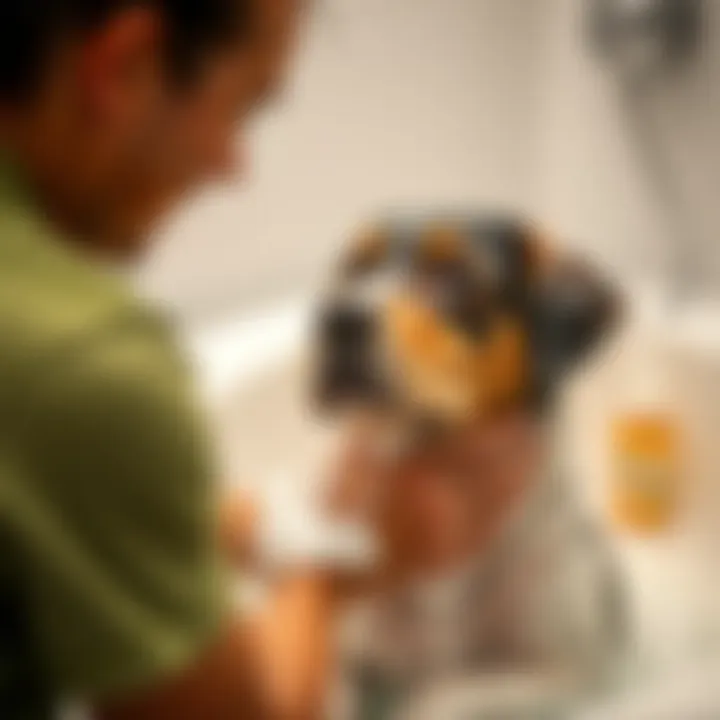Using Dawn Dish Soap for Dog Allergies: A Guide


Intro
Dog allergies can be a source of real concern for pet owners. Settling down to a snuggle with your furry friend can be overshadowed when you notice excessive scratching or irritation. Some folks have turned to household products, like Dawn dish soap, hoping to ease these allergic reactions. This article takes a closer look at that approach and delves into the world of dog allergies—a topic that's as important as it is intricate.
Being part of a pet’s care means diving deep into all possible solutions, including what’s lurking in your cleaning supplies. With Dawn, often praised for its effectiveness, exploring its use presents a potential avenue for relief. However, it’s essential to tread carefully and consider the best practices for applying such products safely.
We will cover the causes behind dog allergies, how Dawn might help, and practical tips for usage. Furthermore, this guide will not shy away from examining alternative methods and what you can do to keep your canine companion comfortable. With insights drawn from yards of experience and research, pet owners can better navigate the sensitive waters of their dog's health and household chores.
There’s no need for fluff. Let’s dig right into the nuts and bolts.
Understanding Dog Allergies
Dog allergies are a significant concern for pet owners, impacting not just the dogs themselves, but the quality of life for the entire household. When understanding dog allergies, it's essential to recognize how individual sensitivities can vary greatly among different breeds and even individual dogs. Knowing the types of allergies—environmental, food-related, or pest infections—can help in diagnosing and treating our canine companions effectively.
This article explores the multifaceted nature of dog allergies, laying the groundwork for practical solutions, such as the use of Dawn dish soap, that might help alleviate some of these allergic reactions. Understanding the different allergy types and their symptoms allows us to better tailor treatments and preventive measures, ensuring our furry friends lead more comfortable lives.
Types of Dog Allergies
The realm of dog allergies is both vast and varied. Let's look at the different kinds, focusing on how they manifest and their significance in crafting a treatment approach.
Environmental Allergies
Environmental allergies are often the culprits responsible for canine discomfort. These allergies can arise from multiple sources, such as pollen, mold, dust mites, and even certain fragrances found in cleaning products.
A defining characteristic of environmental allergies is their seasonal nature. Many dogs experience symptoms during specific times of the year, typically when pollen counts are high. This aspect makes them familiar to many—start sneezing, and you know it’s that time of year again. Most importantly, these allergies can be managed effectively through careful cleaning and treatment of the dog’s environment.
However, the downside is that environmental allergens are ubiquitous, making avoidance a challenge. Hence, a targeted approach, including washing your dog with products like Dawn, can help reduce the allergen load on your pup's fur.
Food Allergies
Food allergies in dogs can be tricky. They're often mistaken for environmental sensitivities or other health problems. A key feature of food allergies is that they can develop over time, which is why it might appear out of nowhere as your dog ages. Common triggers include proteins like beef or chicken and certain grains or dairy products.
Highlighting food allergies is essential for this discussion; managing them often requires a process of elimination to determine the exact trigger. While this can be time-consuming, it is beneficial, as once identified, the right dietary changes can significantly improve a dog’s comfort and general well-being.
But it’s not without its challenges. Dietary restrictions can limit choices for pet owners, and the cost of specialized food can rise sharply. Rising costs and limited options can feel like navigating a minefield while trying to keep your best friend happy.
Flea Allergies
Flea allergies could very well be one of the more common and frustrating sources of itching and irritation for dogs. This type of allergy arises when a dog becomes allergic to flea saliva, triggering intense reactions even from a single flea bite.
The distinct feature of flea allergies is that they can lead to severe itching and scratching at the site of a bite, potentially causing more extensive skin issues. The immediate awareness of the problem makes addressing flea allergies crucial. When pet owners notice their dogs scratching excessively, it often sparks a frenzy of cleaning and treatment to rid the house of pests.
On the flip side, the hunt for effective flea prevention can lead to many complicated solutions. These range from topical treatments to oral medications, each with its own set of pros and cons. That’s where something like Dawn comes into play—it can aid in washing away fleas and their eggs, providing immediate relief.
Symptoms of Dog Allergies
Recognizing the signs of allergies in dogs can be a daunting task, but doing so is paramount to effective management. These symptoms often manifest in various physical and behavioral ways.
Itching and Scratching
Itching is perhaps the most noticeable symptom when it comes to dog allergies. Dogs experiencing allergic reactions will often scratch themselves mercilessly. This behavior can stem from either environmental or flea allergies, and it can escalate, leading to more serious skin problems.
The significance of itching and scratching is undeniable; it’s how dogs express discomfort. This makes it a key indicator that something isn’t right. And while this symptom certainly stands out, it can disrupt not only the dog’s quality of life but also the peace of a household.
Allowing a dog to scratch excessively can lead to open wounds or infections, making management efforts all the more essential. Immediate solutions, such as bathing with Dawn, may provide temporary relief.
Red and Inflamed Skin
Another telling symptom of allergies is red and inflamed skin—an unfortunate but common sight in affected dogs. The inflammation often results from persistent scratching or biting at the affected areas.
This symptom highlights the urgency of addressing allergies effectively. Red skin is not just a visual indicator; it often accompanies itching and potential secondary infections, complicating the situation further. Pet owners must be vigilant, as untreated inflammation can lead to chronic problems that necessitate more invasive interventions. Here’s where Dawn dish soap could come in handy for gentle cleaning.
Excessive Barking and Behavior Changes
Allergy symptoms aren't limited to physical issues; they can extend into behavioral changes as well. Dogs may bark excessively or exhibit unusual behaviors when they're uncomfortable or in pain due to allergic reactions.
This symptom serves as a reminder that emotional and physical well-being often go hand in hand in our pets. It can be seen as a means for dogs to communicate their distress, a call for help if you will. Ignoring excessive barking or changes in behavior, especially in a usually calm dog, can set off alarms.
While behavior changes are often not as overt as scratching or inflamed skin, they are critical in understanding the full picture of a dog’s health. By addressing the underlying allergies, pet owners can contribute to restoring their furry friends' happy demeanor.
The Role of Cleaning in Managing Allergies
When managing dog allergies, cleaning plays a pivotal role. A clean space not only fosters a healthier environment but also mitigates the risk of allergens affecting a dog's well-being. With countless potential irritants lurking around the home, prioritizing cleaning can lead to a significant decrease in allergy-related issues.


Importance of a Clean Environment
A clean environment is crucial in minimizing allergens. For dogs suffering from environmental allergies, regular cleaning can serve as a first line of defense.
Reducing Allergen Exposure
Reducing allergen exposure is key for dogs dealing with allergies. Dust, pollen, and pet dander often hide in corners and atop furniture, where they can easily trigger reactions. Keeping surfaces clean and clutter minimized creates a barrier against these common irritants. The less dust and dander present, the better it is for a sensitive pup.
This approach stands out because it doesn’t cost much and can be employed by any pet owner. Just vacuuming regularly and using washable surfaces can drastically improve conditions for an allergic dog. However, one challenge to consider is that it requires consistent effort; simply cleaning once might not be enough.
Promoting a Healthy Living Space
Promoting a healthy living space means going beyond mere superficial cleaning. It encapsulates the idea of nurturing an environment that actively supports health. Good ventilation and air purification can play a role here, reducing airborne allergens that simple cleaning might miss. By being mindful of the materials used—opting for hypoallergenic and non-toxic products, for example—pet owners can foster a safer haven for their furry friends.
A standout feature of this strategy is its holistic nature; it encompasses diet, cleaning products, and environment modifications. Nevertheless, it requires a considerable commitment from dog owners to maintain these standards consistently, like always keeping windows open or avoiding certain materials in furniture.
Common Household Products for Cleaning
When it comes to cleaning, pet owners often face the dilemma of which products to trust. The choice between commercial cleaners and natural alternatives can significantly impact both a dog's health and the efficacy of the cleaning process.
Commercial Pet Cleaners
Commercial pet cleaners are designed specifically to target pet-related messes, from dander to pesky odors. These products often contain enzymes that break down organic stains, ensuring a deep clean that can alleviate allergy symptoms in dogs. Pet owners find these products invaluable because they assure effectiveness and are often formulated with animals in mind.
However, not all commercial cleaners are created equal; some may contain harsh chemicals that could irritate a dog's skin or respiratory system. The challenge lies in balancing effectiveness with safety. Just because a product is marketed as a pet cleaner doesn’t mean it’s entirely free from harmful substances.
Natural Alternatives
Natural alternatives to commercial cleaners have been gaining traction, offering pet owners a safer route to cleanliness. Ingredients like vinegar and baking soda can effectively tackle odors and remove stains without exposing pets to harmful chemicals. Using these natural alternatives has become a popular choice for those seeking environmentally-friendly options that are gentle on pet health.
While effective, the downside is that these solutions might not be as powerful against tougher stains or odors. They may require more elbow grease or repeated applications to achieve the desired results, which can be a consideration for busy pet owners. Nonetheless, this approach aligns well with broader trends towards sustainability and health-conscious living.
As pet owners navigate cleaning methods, it's crucial to consider the unique needs of their dogs, ensuring that chosen products contribute positively to both cleanliness and overall health.
Dawn Dish Soap: Overview
Dawn dish soap is not just a staple in the kitchen; its properties have drawn attention in the realm of pet care, particularly for addressing dog allergies. Understanding the aspects and benefits of Dawn helps pet owners make informed decisions about cleaning products that can simultaneously foster a healthier living environment for their dogs.
In this section, we will delve into the essential components of Dawn, examining both its chemical makeup and practical applications. The soap's formulation is geared towards washing dishes, but it also has potential when it comes to managing allergies and irritations in dogs. This duality makes it a noteworthy subject, especially for those looking for practical ways to alleviate their dog’s discomfort.
Composition of Dawn Dish Soap
Surfactants and Their Functionality
Surfactants play a critical role in Dawn dish soap. These compounds reduce the surface tension of water, allowing it to spread and penetrate more effectively. Their primary function is to break down grease and dirt, which is essential in ensuring a thorough clean. With dog allergies, the relevance of surfactants extends to their ability to help remove allergens and irritants stuck on the dog's coat and skin.
One key characteristic of these surfactants is their mildness compared to harsher cleaning agents. This is especially beneficial for pets, whose skin can be sensitive. A unique feature of the surfactants in Dawn is their capability to emulsify oily substances, breaking them down so they can be rinsed away easily. That’s crucial when considering the buildup of potential allergens present on a dog’s fur.
On the downside, while these agents are effective, there's always the question of residue. If not rinsed thoroughly, there can be a lingering film that may irritate sensitive skin further. Therefore, careful application and rinsing are advised.
Safety Profile for Pets
The safety profile of Dawn for pets is another crucial consideration. Generally regarded as safe, many users express that it has been a beneficial tool for cleaning pets when they exhibit allergies. One characteristic that stands out is how Dawn is often used in wildlife rescue operations to clean animals impacted by oil spills. This speaks volumes about its relatively gentle formulation, making it a popular choice among pet owners.
However, while its formulation is designed to tackle tough messes, it is essential to be aware of the unique attributes that might pose risks. For example, excessive use can strip necessary oils from a dog's skin, leading to dryness or irritation. Thus, moderation in its application is paramount, as is monitoring your pet for any adverse reactions following use.
Conventional Uses of Dawn Dish Soap
Household Cleaning
Dawn's primary conventional use is within the realm of household cleaning. It has carved out a place as a versatile cleaning agent, excelling in various tasks beyond dishwashing. Its ability to cut through grease makes it a go-to for many, whether it's cleaning stovetops, countertops, or even washing a muddy dog.
For those concerned with allergens, using Dawn in cleaning routines can help maintain a fresh environment, where allergens are minimized. It carries a strong reputation for its capability to detoxify spaces by removing residues that could trigger allergic reactions in both pets and humans.
While it has many positive attributes, potential drawbacks include the environmental impact of synthetic cleaning products, though Dawn has initiatives aimed at sustainability.
Grease Removal
Another strong point of Dawn is its effectiveness in grease removal. This characteristic is not only beneficial for dishes but also extends to household cleaning tasks. The soap's formulation allows it to break down and lift stubborn grease stains, ensuring surfaces are clean and safe. Such properties are particularly handy in preparing a clean area for your pet, reducing the chances of allergens settling in residues.
However, it's crucial to balance this benefit with the need for thorough rinsing. Again, if residue is left behind, it could lead to skin issues in dogs, which could inadvertently worsen allergy symptoms. Property owners should weigh the pros and cons of relying solely on this soap for cleaning, complementing it with other methods and products to ensure an optimal and safe environment for their pets.
Potential Benefits of Dawn for Dog Allergies


Understanding how Dawn dish soap might aid dogs suffering from allergies opens a window to practical solutions amid challenging circumstances. Pet owners often wrestle with the discomfort that allergies bring to their furry friends, and a cost-effective, readily available product like Dawn could be a game-changer. Emphasizing its various abilities, this section explores its potential benefits, particularly in soothing itchy skin and combatting fleas, both common distress factors for dogs with allergies.
Soothing Itchy Skin
Immediate Relief from Irritation
Dogs often exhibit signs of distress when faced with allergies, manifesting primarily through scratching and biting at their skin. Dawn dish soap can offer immediate relief from irritation. The soap contains surfactants that help to remove irritants from a dog’s coat while providing a soothing wash. This is particularly significant because a clean, irritation-free skin provides the first step towards alleviating discomfort.
The key characteristic of this immediate relief is the cleaning action of the soap, which washes away allergens stuck in their fur and skin layers. Many dog owners have found that after giving their pets a bath with Dawn, their dogs tend to scratch less, leading to a noticeable improvement in their mood and behavior. This feature makes Dawn a beneficial choice for pet owners looking for a quick fix for mild allergic reactions. However, it’s also important to note that while it eases irritation, it should not replace veterinary advice or treatment for more severe allergies.
Removing Allergens from Fur
Another notable advantage of using Dawn is its ability to remove allergens from fur. Dust, pollen, and other irritants can cling to a dog’s hair, exacerbating allergic reactions. A bath using Dawn can help lift these allergens away from the fur and skin, making it an excellent method to mitigate exposure to environmental triggers.
This feature is especially useful after long walks outdoors or during peak pollen seasons when dogs are more prone to allergy flare-ups. Notably, the gentle yet effective cleaning power of Dawn allows for comprehensive cleansing without stripping natural oils from the coat, which can otherwise lead to dryness and additional skin issues. The downside, however, lies in the potential for residue if rinsing is not thorough enough, which could lead to further irritation. Therefore, ensuring a thorough rinse post-bath is crucial for maximizing its benefits.
Effectiveness Against Fleas
Flea Elimination Mechanism
Fleas can pose a significant problem for dogs with allergies, leading to skin irritations and anxiety as pets scratch at bites. Dawn dish soap operates effectively against fleas through its unique flea elimination mechanism. The soap's surfactants work by suffocating fleas, disrupting their exoskeletons and ultimately leading to their demise. This action not only helps to eradicate fleas already on your dog but can also assist in breaking the flea lifecycle in your home environment.
What sets this approach apart is the efficacy for immediate use. Many pet owners have shared success stories where a bath with Dawn resulted in visible flea removal in a matter of minutes. While this offers a short-term solution to flea infestations, pet owners should complement soap baths with other prevention measures, as Dawn isn’t primarily designed as a long-term flea treatment.
Preventing Flea Allergies
Preventing flea allergies is another crucial aspect where the use of Dawn can play a role. For allergic pups, even a single flea bite can trigger a severe reaction. By incorporating Dawn into their regular bathing routine, pet owners can help limit exposure to fleas and the discomfort associated with flea bites. The proactive cleansing action reduces the likelihood of fleas settling on their dogs, therefore mitigating any associated allergic response.
The continuous use of Dawn can create a significant difference in allergy management, adding another layer of protection against potential allergens. It's critical, however, for pet owners to remain vigilant about their dog’s surroundings and continued flea prevention tactics to ensure optimal health and comfort.
In summary, leveraging the multi-faceted benefits of Dawn dish soap for dogs with allergies offers pet owners a way to address immediate concerns effectively. While not a catch-all solution, when utilized properly, it can contribute positively to the overall management of allergies and keep canine companions feeling their best.
How to Use Dawn Dish Soap Safely
Using Dawn dish soap can be beneficial for dogs affected by allergies, but safety comes first. To maximize the potential benefits while minimizing any risks, it is essential to follow specific techniques and precautions. This section will delve into recommended application methods and safety considerations, ultimately aiming to create a safer environment for your furry friend while addressing their allergy woes.
Application Techniques
Bathing Procedures
Bathing your dog with Dawn dish soap serves as a thorough means to cleanse not just the fur, but also the skin from allergens. The simplicity of the bathing technique makes it a favored choice among pet owners seeking immediate relief for their dogs. A key characteristic of this method is that it ensures a comprehensive wash, getting rid of potential irritants that may cling to your dog's coat and causing discomfort.
The important step in this process is to wet the dog’s coat thoroughly before applying a small amount of Dawn soap. Work it into a lather, focusing on areas where allergens are likely to stick, including the belly and between the ears. The warmth of the water can ease any anxious feelings your dog may have, while also promoting a deeper clean.
Advantages of this method include:
- Effective Allergen Removal: Bathing can wash away pollens, dust, and other irritants.
- Hydration of Skin: Regular bath sessions can aid in hydrating the skin if done correctly.
However, it’s crucial to consider that not every dog enjoys baths; hence, patience is key. Furthermore, bathing too frequently can sometimes lead to skin irritation if the skin's natural oils are stripped away.
Spot Cleaning Method
For a less intensive option, spot cleaning with Dawn dish soap can be a practical solution. This technique is particularly helpful when your dog has localized irritation or when immediate bathing isn’t possible. Spot cleaning focuses on areas that show signs of allergic reactions like redness or swelling.
Here, a small cotton ball or cloth soaked in a diluted mixture of Dawn and water can be gently applied to the affected area. It acts as a swift remedy, addressing the specific concern without the fuss of a complete bath.
Key features of spot cleaning include:
- Targeted Application: You can directly combat the areas that need it the most.
- Less Stress for Your Dog: It's a quicker process that can be less daunting for anxious pets.
On the downside, relying solely on spot cleaning can overlook broader issues. In some cases, a full bath may be necessary to fully remove allergens from the coat.
Safety Precautions
Rinsing Thoroughly to Avoid Residue
One of the most critical safety precautions when using Dawn dish soap is to ensure that all residues are completely rinsed off. Leftover soap can irritate your dog's skin, leading to further discomfort and even allergic reactions. Proper rinsing helps eliminate any soap traces that might linger, making it a fundamental step in the bathing or cleaning process.
A highlight of thorough rinsing is that it can enhance the benefits of the wash. By removing all traces of soap, it allows for your dog's skin and fur to breathe and feel comfortable. It’s often advisable to rinse until the water runs clear and free from suds.
Advantages include:
- Prevention of Skin Irritation: Reducing residue minimizes the chance of reactions.
- Comfort for Your Dog: A thorough rinse makes for a more pleasant experience overall.


Falling short on this step can negate the benefits of the cleaning process, conversely leading to deeper skin problems.
Monitoring for Skin Reactions
Constant vigilance after applying Dawn dish soap is essential. Monitoring for skin reactions allows you to catch any issues early. This key characteristic of the precaution is paramount, especially as pets may react differently to products, even if they are generally considered safe.
Observe for signs of redness, swelling, or excessive scratching following the use of the soap. If you notice anything out of the ordinary, consult a veterinarian promptly. Keeping a close watch can assist in ensuring a swift response if your dog shows any unwelcomed side effects from the treatment.
Advantages include:
- Immediate Action: Addressing potential issues quickly is always beneficial.
- Tailored Care: You can adapt your approach to your pet’s unique needs.
While monitoring may seem tedious, it’s a worthwhile investment for the health and safety of your dog.
Alternatives to Dawn Dish Soap
When dealing with dog allergies, exploring options beyond Dawn dish soap opens up a world of possibilities for pet owners. While Dawn may offer certain advantages, a range of alternatives can provide effective solutions tailored to specific needs. This section will dive into commercial shampoos and household ingredients that can assist in managing your dog's allergies effectively.
Commercial Shampoo Options
Allergy-Specific Shampoos
Allergy-specific shampoos are designed with unique ingredients that cater specifically to dogs suffering from allergic reactions. They often contain soothing agents and natural extracts that help alleviate itching and inflammation while also being gentle on the skin. These shampoos stand out in the pet care market, particularly because they are formulated to address the common triggers related to allergies, including pollen, dust mites, and certain ingredients in food.
The key characteristic of allergy-specific shampoos is their targeted action. They may incorporate elements like aloe vera or oatmeal, renowned for their hydrating properties. With a focused approach, these shampoos can deliver relief that general shampoos might not offer, making them a beneficial choice for dog owners looking to tailor their pet’s care. One potential challenge, however, is that some of these shampoos can be on the pricey side, which might deter some pet owners from making a switch.
Natural Ingredient Shampoos
Natural ingredient shampoos are gaining traction among pet owners seeking gentler alternatives. These shampoos typically feature a blend of botanicals, such as chamomile, lavender, or coconut oil. They appeal to a growing demographic that values sustainability and eco-friendly products. By using natural ingredients, these shampoos not only care for your dog’s coat but also minimize exposure to harsh chemicals that could exacerbate skin issues.
What makes natural ingredient shampoos a favored option is their versatility. They not only cleanse the coat but can also impart additional benefits like a pleasant scent and hydration. However, there can be drawbacks, including the occasional reaction to specific natural extracts for some dogs. It's essential for pet owners to conduct a patch test and observe their pets after using these products for the first time.
Household Ingredients
Baking Soda
Baking soda is a surprising yet effective remedy against dog allergies. This common kitchen item has properties that can help soothe itchy skin and eliminate odors, making it a go-to for many pet owners. Its alkalinity helps neutralize acidic irritation and can provide relief for scratching or inflamed skin.
What makes baking soda a popular choice is its safety profile and ease of use. You can mix it with water to form a paste and apply it directly to the affected areas, or simply add it to your dog’s bath. One limitation to note is that while baking soda can be effective for many dogs, it might not work the same for every pet, so observant pet owners should keep an eye on how their dogs react during and after use.
Apple Cider Vinegar
Apple cider vinegar (ACV) is another household staple that can shine in the realm of dog care. With its antimicrobial properties, ACV can help combat skin infections that may arise from allergies. It can also work as a natural flea repellent, which is beneficial since flea allergies are one of the prevalent causes of dog discomfort.
The unique feature of apple cider vinegar lies in its dual action. First, it aids in reducing inflammation when applied externally. Second, when diluted and fed to dogs in small amounts, it purportedly assists in balancing their internal pH levels, which can contribute to overall skin health. However, care must be taken to dilute it properly to prevent any adverse reactions in dogs that have sensitive skin.
In summation, discussing alternatives to Dawn dish soap offers pet owners valuable insights into maximizing their dog's health and comfort. It's worth exploring commercial shampoos that are allergy-specific or based on natural ingredients while also considering accessible household items like baking soda and apple cider vinegar. Each of these options serves a purpose, yet what's crucial is determining which aligns best with your dog's unique needs.
Additional Measures for Managing Dog Allergies
Addressing dog allergies requires more than just a few baths with Dawn dish soap. It’s a combination of careful planning, consistent maintenance, and basic lifestyle changes that can make a big difference in your pet's life. This section underscores the importance of complementing the topical treatments with internal and environmental adjustments. By taking a holistic approach, pet owners can effectively alleviate symptoms, enhance their dog's quality of life, and minimize allergy triggers.
Dietary Considerations
Identifying Allergenic Foods
Recognizing which foods trigger allergic reactions in dogs can be a game changer. Each dog is unique, and their response to certain ingredients can vary widely. Common allergenic foods typically include beef, dairy, wheat, and chicken. Identifying these can help pet owners steer clear of potential problems. By keeping a food diary to track what your dog eats and noting any subsequent reactions, you can begin to decipher which foods don't sit well with your furry friend.
Additionally, switching to a limited-ingredient diet might be worth considering. This approach reduces the number of potential allergens in one go. Not only can it simplify meal planning, but it also helps in isolating any offending ingredients. However, it’s important to do this gradually, as sudden changes to your dog's diet can upset their stomach.
Consulting with Veterinarians
Never underestimate the importance of a qualified veterinarian's insight. Consulting with a vet becomes essential when trying to navigate the murky waters of dietary allergies. These professionals can help identify food sensitivities through allergy testing or elimination diets that could lead you to the root cause of your dog's discomfort.
Beyond food allergies, a vet can also suggest suitable hypoallergenic dog foods that are still nutritious. This is crucial, as the aim is not just to eliminate allergens but to ensure that your dog is getting all the necessary nutrients. While it may involve more work up front, having a vet's guidance can save you time and provide peace of mind, knowing that your dog is on the right track.
Environmental Changes
Vacuuming and Air Purification
Maintaining a clean home plays a pivotal role in managing allergies. Regular vacuuming helps to reduce the accumulation of dust, pollen, and dander — allergens that can trigger unusual reactions in dogs. When using a vacuum, it’s wise to opt for one equipped with a HEPA filter to capture as many allergens as possible.
In addition, air purifiers can work wonders for both pets and humans in a home. They can remove airborne allergens from pet dander to dust mites, providing a more allergen-free environment. Investing in an air purifier with a HEPA filter can be particularly beneficial, especially during high pollen seasons. By focusing on a clean living space, pet owners can mitigate some allergy triggers right at home.
Reducing Outdoor Allergen Exposure
Dogs face allergens not only inside the home but also outdoors. Pollen from trees, grasses, and weeds can wreak havoc on sensitive systems. While you can’t control the environment, there are measures you can take to limit your dog’s exposure. For example, walking your dog during the early morning or late evening can help avoid peak pollen times.
Additionally, after outdoor play, ensuring that you wipe down your dog with a damp cloth or give them a bath can help rid their fur of allergens before they traipse back into the house. Implementing such strategies can keep your home cleaner and minimize allergy symptoms alongside using cleaning products like Dawn dish soap.















